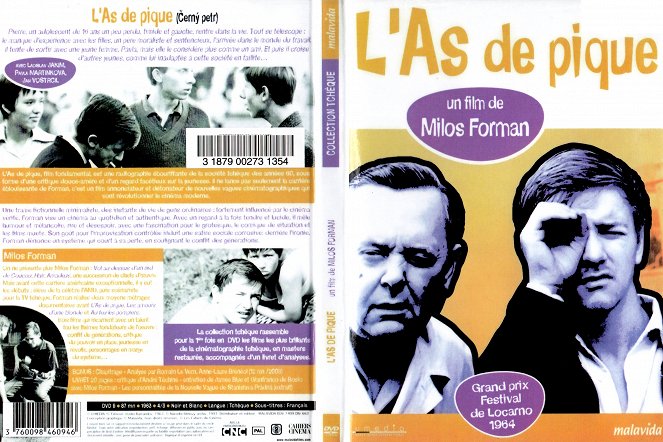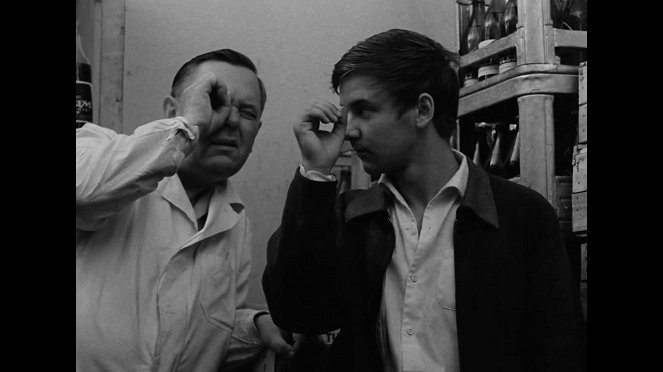Directed by:
Miloš FormanCinematography:
Jan NěmečekComposer:
Jiří ŠlitrCast:
Ladislav Jakim, Pavla Novotná, Jan Vostrčil, Vladimír Pucholt, Pavel Sedláček, Zdeněk Kulhánek, František Kosina, Josef Koza, Božena Matušková (more)VOD (1)
Plots(1)
The sixteen-year old apprentice Petr begins his training in a self-service shop. The manager of the shop, the only man among all the women, entrusts the young flabbergasted man with his first task - to move around the shop and catch potential thieves. Petr does his best but the manager reprehends him for being too conspicuous in his white cloak. Petr finds behaviour of an elderly man suspicious, and when he confides this to the cashier, the woman sends him to follow the man. The perplexed youth shadows the man throughout the city for the rest of the shift. Petr does not get on well with his parents - his mother sees only a small boy in him and his father takes pleasure in pontificating to him in long monologues. Petr spends Sunday at a bathing pool with the girl, who accepts his inept courting with a degree of affection. The bricklayer's apprentice Čenda disturbs them and, with the support of his friend Zdeněk, tries to start a fight. The dissention ends with the broken elastic of Zdeněk's trunks. At a dance where they all meet together again, Čenda borrows twenty crowns from Petr, gets drunk and falls asleep. In the shop, Petr spots a woman trying to squeeze a sack of sweets into her bag. But, after the failure of his first efforts, he does not do anything. At home, he confides to his father, but the old man again overwhelms him with lots of clichés. The father calms down only upon finding out that nobody knows about the affair. Čenda comes to them to give back the borrowed sum and the father forces him to display to Petr his work-worn palms. The story ends with the father's unfinished preaching. (official distributor synopsis)
(more)Videos (1)
Reviews (4)
After every other film from the Czechoslovak New Wave, I wonder how it’s possible that we’re not extinct. *** I still have an amusing memory of Black Peter from my university days, when at a college party a classmate glowingly explained the principles of the CNW to Indian and Korean students, which culminated in everyone high-fiving each other for immediately watching Black Peter, with the catch that I, who signed on to do the subtitles for the TV series, would translate it simultaneously. The Erasmus students picked up chips and beers and excitedly spread around the room in anticipation of the comedy that their classmate (perhaps Miloš?) had promised them. Sometime around the dialogue "Shall we dance?" "But there's no music." "Well, I'll come again." they had definitely become convinced that I didn't speak much English and was just making up the lines from scratch. So they slowly began dropping off, establishing a base on the balcony behind a wall of apologetic smiles. We finished the film with a classmate who kept insisting I keep translating from the English, even though there was no one to translate for. I didn't even mind, because as the Erasmians disappeared, so did the ban on smoking in the rooms. What was that classmate's name...?
()
"May I ask?" - "But they're not playing..." - "Oh well. Then I'll come later." Even today, there are individuals like Pucholt's exhibition tatar Čenda. Moreover, anyone who has not experienced the feeling of slight loss on the journey of life has not experienced puberty. And it is precisely because of that, this experience from the position of an impartial observer is such a comfort.
()
A symphony of awkwardness, banality, everyday stereotypes, naivety, adolescent youth, and the rudeness of adults. In its time, this film literally represented a revolution because it broke all the ideas of what a film script and an engaged film should be. Today, it represents a classic for me that has not lost any of its impact even after half a century. The creators of the British series The Office brought this style to perfection, creating a much more compact work, where adolescent immaturity doesn't play a role but rather emphasizes the rudeness and awkwardness of adult characters in responsible positions. Overall impression: 75%.
()
The first feature film by Miloš Forman, in which you can see how perfectly he was able to capture the characters of our little world. Some scenes are almost absurd and sound enchanting, especially in the sense that we have similarly nonsensical conversations among ourselves. This film wonderfully reflects the time... However, it's quite amusing that even after 50 years, it hasn't lost any of its relevance. We still encounter similar people, and we are still compelled to do similar things.
()
Gallery (9)
Photo © Malavida



Ads